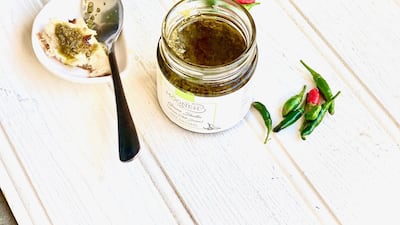From the garum fermented fish sauce used in the cuisines of Phoenicia, ancient Greece and Rome, to the simple but beloved ketchup, using condiments to enhance our food has a long history.
Right now we are in a golden era of choice, and some of the biggest culinary trends, innovations and obsessions in recent years have centred on the flavour combinations of the sauce or garnish that spruce up the main dish.
Dima Sharif, author of Plated Heirlooms, launched Mooneh Foodstuff Supply Services in 2013, as the UAE's first dedicated fermenter. "Back then people were not talking about fermentation, but now we do pickles, relishes, spreads, sauces and jams," she says.
Jams, especially, have gone beyond the basics. Even market advisory company Mordor Intelligence – more used to advising stock market investors – says: "Jams, jellies and preserves are experiencing an increasing demand all over the world."
Mooneh's beetroom jam, says Sharif, "works in chocolate cakes, or orange and lemon sponges. It goes especially well with sugar cookies and also gives them a lovely colour". The brand's red chilli jam, meanwhile, can elevate a simple rice pudding, and its green chilli sauce pairs with sugary Middle Eastern treats to balance out the sweet and savoury experience.
"Spicy condiments are a good addition to chocolate cakes and work especially well when you're making truffles," says Sharif.
Hot sauces, too, have also experience huge growth in the past decade. While the famous Sriracha brand has developed a near-cult following, with more than $20 million being spent on bottles worldwide every year, local artisans are also creating varieties to bring out new flavour combinations.
Dubai's Zafi Artisanal Hot Sauce is made from the famously fiery Scotch bonnet peppers and comes from a family recipe that dates back more than 70 years, while Mooneh makes six varieties of Arabian hot sauce called shatta, from fermented organic red and green chillis using traditional woodchip smoke.
Uwe Micheel, a former saucier at the Michelin-starred London restaurant Le Souffle and culinary advisor to the Radisson Blu in Dubai, explains some of the key elements that creators need to look at. "To get the perfect balanced dish, you need to have all textures and flavours, soft and crisp, sweet and sour, salty and bitter, but most of the time you just have to add some acid, which could be wine, vinegar or citrus juice, and it will change the profile of the dish completely. The key is not to add too much."
Micheel also makes his own condiments and jams. “My last homemade jam had figs and dates as the key ingredients, and was rounded up with ginger, red chilli and lime. I pair this with a slow-cooked pulled-beef burger.”
Other interesting flavour combinations include strawberries with balsamic vinegar; Tabasco sauce on grilled pineapple; peanut butter with goat’s cheese; Golden syrup on cheddar; mango salsa and brie; and, for a big umami hit, British favourite Marmite with cheddar in a grilled toastie.
A range of interesting additions are being sold by local artisans at places such as Ripe Market, while restaurants such as The Lime Tree Cafe makes tomato aubergine and cumin relish, an Arabian date chutney, and a zaatar and onion marmalade.
Ripe Market vendor Corinne Sfier, who runs Emm Daniel, has a vegan, gluten and dairy-free range that includes celery pesto, broccoli pesto, almond butters, caramel sauces, sauerkraut, cranberry peanut butter and Coco Choco, a healthier alternative to chocolate spread.
“Our natural nut butters go well with apple slices or sauerkraut for breakfast or a snack; we have a recipe for peanut butter and Asian soup on our website,” Sfier says.
Most UAE suppliers also opt to support local producers. “We buy from the local organic farmers and use seasonal produce,” says Sharif. “At the moment olives and olive oil are in season, so we are making Kalamata olive and sun-dried tomato tapenade. We’ll even dry the tomatoes ourselves to create the tapanade.”

